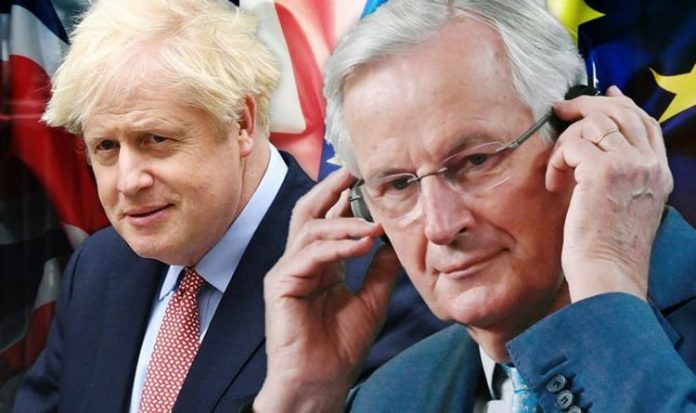Throughout the Brexit negotiations, the EU has pushed for the UK to accept its state aid rules, which do not allow unfair subsidies to be granted. However, Brussels eventually made a major concession during the summer and dropped its demand that Britain should continue to follow its rules directly. Instead, the EU is now asking the UK to publish what its state aid rules will look like after December 31 – the end of the transition period.
The bloc also wants Britain to outline the terms on which “an independent, domestic regulator would operate, and to agree a robust dispute-resolution mechanism with the EU” in the case of allegations of unfair market competition.
This has become a major point of contention, with the EU warning that any agreement on managing state aid would need to be taken “at the highest level” because it clashes with the bloc’s original trade proposals.
Downing Street “believes that a deal can be reached on state aid” in which Britain would agree to meet some “baseline rules” over its use.
However, while the UK is looking to enter intense talks to seal a deal by the October 15 EU summit, the EU has warned that this will only happen if there is significant movement on the part of London.
As the talks enter a crucial final phase, Professor of Law at Essex University, Steve Peers, has revealed what the most workable compromise between the two sides could be.
Mr Peers argued that a possible compromise might consist of the UK agreeing to a domestic framework on state aid, with effective enforcement and dispute settlement, governed not by EU law but by international law in the form of the World Trade Organisation’s subsidies code.
He explained: “The Institute For Government think tank has produced detailed proposals as to how that might work.
“Both sides could, if they chose, declare this as a victory: the UK would no longer be applying current or future EU law, and there would be no role for the EU court. Meanwhile, the EU would have a commitment from the UK to apply restrictions on subsidies, enforceable by arbitration if need be.
JUST IN: Donald Trump tipped to win US election by Australian Senator
“But it would nevertheless need both sides to compromise: there are reportedly some in the UK Government who want to avoid any significant commitment on subsidies or state aid at all – and it is hard to imagine the EU agreeing to that.
“Each side points to examples of what the EU has agreed to in the past: the UK position is similar to what the EU has agreed to with Canada, for instance.
“But then Japan and the EU have agreed to more restraints on subsidies, similar to the possible compromise suggested above; and the UK has accepted those constraints in its own free trade agreement with Japan.”
A final complication, Mr Peers noted, is the connection between this issue and the UK’s controversial Internal Market Bill.
DON’T MISS:
Nigel Farage’s NEW plan to dethrone Boris Johnson exposed [ANALYSIS]
Furious Italexit campaigner lashes out at EU [EXCLUSIVE]
Trump has ‘strong chance to win as he undertook economic miracle’ [REVEALED]
He added in his recent piece for The Conversation: “The bill would give ministers power to override the state aid rules in the Northern Ireland protocol to the withdrawal agreement, which goes even further than what the EU has proposed for the future free trade deal with the whole UK (for instance, the EU Commission decides on whether to allow the aid).
“Time will soon tell whether the two sides are willing to thrash out a compromise on this issue – and whether, even if they do so, the talks might nevertheless be derailed for some other reason.”







